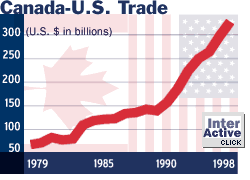 |
By Barry Brown The Terrific Trio Understanding the Game Open Market Brings Huge Gains
Copyright ©1999 ABC News Internet Ventures.
Special to ABCNEWS.com
M O N T R E A L, June 18
— Trade between the world’s two largest business partners — the United States and Canada — changed forever 10 years ago when a historic free trade agreement went into effect.
The pact phased out discriminatory import taxes on the others’ goods and services. Since then, U.S. exports to Canada have shot up by 149 percent and imports from Canada have jumped by 169 percent.
Yet for all the wealth that has flowed between the two countries over the decade, Canadians’ standard of living has not kept pace with the Americans’ Nor has Canada’s economy kept up with record U.S. expansion.
The passage of the North American Free Trade Agreement five years ago added Mexico to the U.S.-Canada trade mix. That deal boosted Mexico’s economy and brought in billions of dollars, even as some U.S. jobs migrated south of the border.
Free trade architects from the United States, Canada and Mexico gathered recently in Montreal to declare victory and assess what they’d accomplished.
Former president George Bush recalls that as vice president, he “supported the free trade agreement with Canada, and as president I was committed to continuing opening markets for American goods, service and farm products. We recognized that exports were a growing element of our economic growth so we naturally had an interest in finding better access to more markets.”
Although Canadians were so passionately divided on the issue that a national election was needed to settle the question of opening their markets to full competition with the huge corporations to the south, the fallout has been generally positive.
Charles Sirois, chairman of Canadian-based Teleglobe Inc. and Telesystems Ltd., says when he took over the state-owned telecommunications monopoly in 1992, it was excluded from the agreement. So, he immediately went to the Canadian capital of Ottawa and asked the government to open the market to free-trade competition.
As Sirois recalls, the minister in charge thought he “was like a turkey asking for more Thanksgivings.” That was until Sirois explained that his company could lose 50 percent of the Canadian market and replace it with just 3 percent of the enormous U.S. market. Since losing his monopoly, he noted, the company’s capitalization has soared to more than $10 billion U.S., from $340 million.
Though most Canadian export businesses have flourished under free trade, overall, Canadians’ standard of living has lagged behind its bigger neighbor to the south.
A study by the Royal Bank of Canada shows that Canadian living standards — as measured by real disposable income — have declined by 5 percent, while that of Americans has risen by 12 percent.
Canada’s share of foreign direct investment also has declined, both in world and North American terms. Although its major stock market, the Toronto Stock Exchange, has climbed 95 percent in past decade, it has lagged compared to the 340 percent gains for the U.S. S&P Index in the same period.
Mexico, too, has seen a tremendous explosion in its economic development five years after opening to full, multinational competition under NAFTA.
Before NAFTA, said Mexico’s trade negotiator Jaimie Puche, Mexico’s economy was virtually closed. Since joining NAFTA and the global trade agreement called GATT, Mexico’s exports have boomed to $120 billion last year, from $21 billion, of which nearly 70 percent was oil.
Of that, he says, 90 percent is manufacturing products, which this year are expected to reach $115 billion. And, he says, “that would have been impossible if the Mexican economy would have been kept closed,” because Mexican producers would not have been competitive in the global market.
Indeed, because of the agreements, both Canada and Mexico were able to export their way out of economic problems. NAFTA helped Mexico get over the 1994 crash of its currency in just 18 months, compared with six years of hard times during the so-called Third World Debt Crisis of the 1980s. And exports to the United States led Canada out of its recession of the early 1990s.
Opening the borders to trade has even brought about a fundamental turnaround in Canadian politics. If free trade was heresy for some in Canada a decade ago, it’s now become political and economic mainstream.
